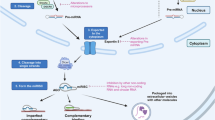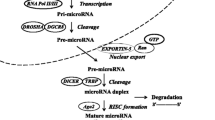Abstract
Background
MicroRNAs are classes of endogenous noncoding RNAs that play a substantial role in tumor processes through regulating the targets at posttranscriptional level. However, little is known about the upstream transcription regulatory mechanism although it is a prerequisite for investigation of its aberrant expression and function.
Aims
This report evaluates miR-106a’s direct transcriptional factor from upstream level to in depth elucidate their communication in gastric cancer development.
Methods
Gastric cancer tissues were collected to analyze the miR-106a expression using real-time PCR methods. The combination of Kruppel (or Krüppel)-like factor 4 (KLF4) to miR-106a promoter was testified through bioinformatics followed by construction of luciferase reporter plasmid and chromatin immunoprecipitation assay. Functional experiments and mouse models for evaluating cell growth and metastasis were conducted to observe the biological effect of KLF4 on miR-106a. The interplay between KLF4 and miR-106a was tested with Wnt activator and confirmed in clinical specimens.
Results
The up-regulated miR-106a linked to gastric cancer metastasis and epithelial–mesenchymal transition. UCSC and JASPAR predicted the promoter sequence of miR-106a and its binding site with transcriptional factor KLF4. Construction of reporter gene further verified their direct combination at upstream level. Moreover, the inhibitory effect of KLF4 on the phenotype of gastric cancer cells could be restored by miR-106a. CHIR-induced experiment and clinical specimens confirmed the negative regulation of KLF4 on miR-106a.
Conclusions
Our findings provide novel direct insights into molecular mechanisms for interaction of KLF4 and miR-106a at upstream level and new ways for clinical application of KLF4–miR-106a axis in advanced gastric cancer metastasis.





Similar content being viewed by others
Abbreviations
- KLF4:
-
Kruppel (or Krüppel)-like factor 4
- EMT:
-
Epithelial–mesenchymal transition
- ChIP:
-
Chromatin immunoprecipitation
- TSS:
-
Transcription start site
- H&E:
-
Hematoxylin and eosin
- IHC:
-
Immunohistochemistry
- qRT-PCR:
-
Quantitative real-time PCR
References
Siegel RL, Miller KD, Jemal A. Cancer statistics, 2017. CA Cancer J Clin. 2017;67:7–30.
Molina-Castro S, Pereira-Marques J, Figueiredo C, et al. Gastric cancer: basic aspects. Helicobacter. 2017;22:1.
He Z, Zhao TT, Xu HM, et al. Efficacy and safety of intraperitoneal chemotherapy in patients with advanced gastric cancer: a cumulative meta-analysis of randomized controlled trials. Oncotarget. 2017;8:81125–81136.
Romano G, Veneziano D, Acunzo M, et al. Small non-coding RNA and cancer. Carcinogenesis. 2017;38:485–491.
Shi Z, Wei Q, She J. microRNAs in gastric cancer metastasis. Crit Rev Eukaryot Gene Expr. 2014;24:39–53.
Zhao X, Li X, Yuan H. microRNAs in gastric cancer invasion and metastasis. Front Biosci (Landmark Ed). 2013;18:803–810.
Zheng Y, Liu L, Shukla GC. A comprehensive review of web-based non-coding RNA resources for cancer research. Cancer Lett. 2017;407:1–8.
Bartel DP. microRNAs: genomics, biogenesis, mechanism, and function. Cell. 2004;116:281–297.
Hammond SM. An overview of microRNAs. Adv Drug Deliv Rev. 2015;87:3–14.
Cho WC. OncomiRs: the discovery and progress of microRNAs in cancers. Mol Cancer. 2007;6:60.
Xiao B, Guo J, Miao Y, et al. Detection of miR-106a in gastric carcinoma and its clinical significance. Clin Chim Acta. 2009;400:97–102.
Wang Z, Liu M, Zhu H, et al. miR-106a is frequently upregulated in gastric cancer and inhibits the extrinsic apoptotic pathway by targeting FAS. Mol Carcinog. 2013;52:634–646.
Zhou Y, Ferguson J, Chang JT, et al. Inter- and intra-combinatorial regulation by transcription factors and microRNAs. BMC Genomics. 2007;8:396.
Zhang N, Zhang J, Shuai L, et al. Kruppel-like factor 4 negatively regulates beta-catenin expression and inhibits the proliferation, invasion and metastasis of gastric cancer. Int J Oncol. 2012;40:2038–2048.
Segura MF, Jubierre L, Li S, et al. Kruppel-like factor 4 (KLF4) regulates the miR-183 ~ 96 ~ 182 cluster under physiologic and pathologic conditions. Oncotarget. 2017;8:26298–26311.
Calin GA, Croce CM. microRNA signatures in human cancers. Nat Rev Cancer. 2006;6:857–866.
Calin GA, Croce CM. microRNA-cancer connection: the beginning of a new tale. Cancer Res. 2006;66:7390–7394.
Iorio MV, Croce CM. microRNA dysregulation in cancer: diagnostics, monitoring and therapeutics. A comprehensive review. EMBO Mol Med. 2012;4:143–159.
Li P, Xu Q, Zhang D, et al. Upregulated miR-106a plays an oncogenic role in pancreatic cancer. FEBS Lett. 2014;588:705–712.
Liu Z, Gersbach E, Zhang X, et al. miR-106a represses the Rb tumor suppressor p130 to regulate cellular proliferation and differentiation in high-grade serous ovarian carcinoma. Mol Cancer Res. 2013;11:1314–1325.
Wang Z, Wang B, Shi Y, et al. Oncogenic miR-20a and miR-106a enhance the invasiveness of human glioma stem cells by directly targeting TIMP-2. Oncogene. 2015;34:1407–1419.
Varghese VK, Shukla V, Kabekkodu SP, et al. DNA methylation regulated microRNAs in human cervical cancer. Mol Carcinog. 2018;57:370–382.
Deng S, Calin GA, Croce CM, et al. Mechanisms of microRNA deregulation in human cancer. Cell Cycle. 2008;7:2643–2646.
Mao L, Zhang Y, Deng X, et al. Transcription factor KLF4 regulates microRNA-544 that targets YWHAZ in cervical cancer. Am J Cancer Res. 2015;5:1939–1953.
Lee Y, Kim M, Han J, et al. microRNA genes are transcribed by RNA polymerase II. EMBO J. 2004;23:4051–4060.
Church VA, Pressman S, Isaji M, et al. Microprocessor recruitment to elongating RNA polymerase II Is required for differential expression of microRNAs. Cell Rep. 2017;20:3123–3134.
Zhou X, Ruan J, Wang G, et al. Characterization and identification of microRNA core promoters in four model species. PLoS Comput Biol. 2007;3:e37.
Wong ES, Schmitt BM, Kazachenka A, et al. Interplay of cis and trans mechanisms driving transcription factor binding and gene expression evolution. Nat Commun. 2017;8:1092.
Shields JM, Christy RJ, Yang VW. Identification and characterization of a gene encoding a gut-enriched Kruppel-like factor expressed during growth arrest. J Biol Chem. 1996;271:20009–20017.
Li J, Zheng H, Yu F, et al. Deficiency of the Kruppel-like factor KLF4 correlates with increased cell proliferation and enhanced skin tumorigenesis. Carcinogenesis. 2012;33:1239–1246.
Yu T, Chen X, Lin T, et al. KLF4 deletion alters gastric cell lineage and induces MUC2 expression. Cell Death Dis. 2016;7:e2255.
Hsu LS, Chan CP, Chen CJ, et al. Decreased Kruppel-like factor 4 (KLF4) expression may correlate with poor survival in gastric adenocarcinoma. Med Oncol. 2013;30:632.
Wei D, Gong W, Kanai M, et al. Drastic down-regulation of Kruppel-like factor 4 expression is critical in human gastric cancer development and progression. Cancer Res. 2005;65:2746–2754.
Ai Z, Shao J, Wu Y, et al. CHIR99021 enhances Klf4 expression through beta-catenin signaling and miR-7a regulation in J1 mouse embryonic stem cells. PLoS One. 2016;11:e0150936.
Acknowledgments
This study was funded by China Postdoctoral Science Foundation (Grant Number 2018M633529), the Ningxia Natural Science Foundation (Grant Number NZ16148, NZ16276), Outstanding Young Teachers Development Foundation of Ningxia Higher Education Institutions (Grant Number NGY2016123) and Basic Research Project of Natural Science Foundation of Shaanxi Province (Grant Number 2017JM8120).
Author’s contribution
Meng Zhu and Shuixiang He conceived and supervised the study; Meng Zhu and Ning Zhang designed and performed experiments; Meng Zhu analyzed data and wrote the manuscript; Shuixiang He and Xinlan Lu made manuscript revisions.
Author information
Authors and Affiliations
Corresponding author
Ethics declarations
Conflict of interest
The authors declare that they have no conflict of interest.
Electronic supplementary material
Below is the link to the electronic supplementary material.
Rights and permissions
About this article
Cite this article
Zhu, M., Zhang, N., Lu, X. et al. Negative Regulation of Kruppel-Like Factor 4 on microRNA-106a at Upstream Transcriptional Level and the Role in Gastric Cancer Metastasis. Dig Dis Sci 63, 2604–2616 (2018). https://doi.org/10.1007/s10620-018-5143-z
Received:
Accepted:
Published:
Issue Date:
DOI: https://doi.org/10.1007/s10620-018-5143-z




